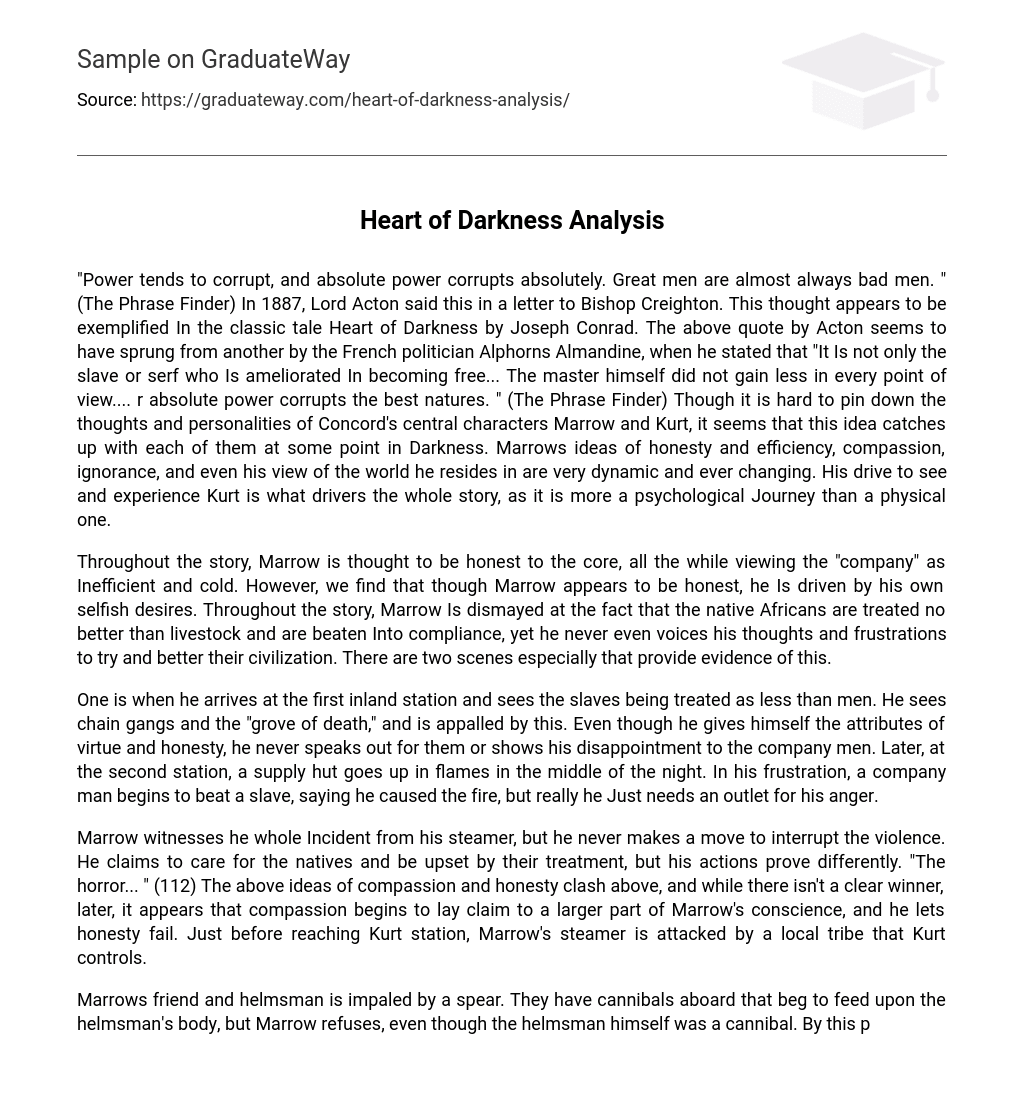“The Phrase Finder” quotes Lord Acton as saying, “Power tends to corrupt, and absolute power corrupts absolutely. Great men are almost always bad men.” Acton expressed this sentiment in a letter to Bishop Creighton in 1887. This concept seems to be illustrated in Joseph Conrad’s Heart of Darkness. Similar thoughts on the corrupting nature of power can be found in a statement by French politician Alphorns Almandine, who said, “It Is not only the slave or serf who Is ameliorated In becoming free…The master himself did not gain less in every point of view….or absolute power corrupts the best natures.” These ideas appear to affect the main characters Marrow and Kurt in various ways throughout the story. Marrow undergoes significant changes in his beliefs regarding honesty, efficiency, compassion, ignorance, and his perception of the world he inhabits. His motivation to encounter Kurt drives the entire narrative, making it a psychological journey rather than a physical one.
Throughout the story, Marrow is perceived as genuinely honest, but he also holds a negative perception towards the “company,” considering it as inefficient and cold. However, we discover that despite Marrow’s outward honesty, his actions are motivated by his own selfish desires. Marrow is deeply troubled by the mistreatment of native Africans in their subhuman conditions and the use of physical violence to force compliance. Despite his distress, Marrow fails to articulate his thoughts and frustrations to contribute to the improvement of their society. This lack of action is evident in two particular scenes.
When the protagonist reaches the initial inland station, he encounters the cruel treatment of slaves, witnessing chain gangs and the horrifying “grove of death.” Despite considering himself virtuous and honest, he remains silent and refrains from expressing his dismay to the company men. Later on, at the second station, a supply hut catches fire during the night. Frustrated, a company man starts beating a slave, blaming him for the fire while truly seeking an outlet for his anger.
Marrow observes the entire incident from his steamer without intervening in the violence, despite claiming to care for the natives and being disturbed by their mistreatment. However, his subsequent actions contradict these sentiments. The clash between compassion and honesty is evident, with no clear victor emerging. Eventually, compassion begins to dominate Marrow’s conscience while honesty fades away. Right before reaching Kurt’s station, Marrow’s steamer is assaulted by a local tribe under Kurt’s control.
Marrows friend and helmsman is impaled by a spear. They have cannibals aboard that request to feed upon the helmsman’s body, but Marrow declines, even though the helmsman himself was a cannibal. At this point, Marrows perceptions of reality and morality are distorted, and he is uncertain about his thoughts. Nonetheless, he manages to retain enough of himself to discard the helmsman’s body into the water. This is the moment when his principles and values are displayed once again. In the conclusion of the story, Marrow visits Kurt’s Intended In London to inform her about his death.
She is interested in finding out exactly how Kurt died and especially how he lived in his last hours. Marrow is aware of the tragedies of Kurt’s last words and hopes that he mentioned her name. Marrow can sense this desire in her and, unable to disappoint her internally, he deceives her by telling her that Kurt did speak of her. However, in reality, Kurt never mentions her in his final moments; instead, he expresses how awful it is for him to die in such a manner, considering his accomplishments, despite their terrible nature. Marrow’s inconsistent ideas make it difficult to relate to him. Mr. Kurt is merely a name to Marrow, just as he is to you.
Initially, Marrow only joined this job to alleviate boredom and to experience different countries. However, over time, his opinion of Kurt begins to change significantly. While waiting for rivets, Marrow frequently contemplates and sometimes thinks about Kurt, although he claims not to be interested in him initially. But within a few pages, Marrow reveals that his attention is solely focused on Kurt. This fickleness in his thoughts is evident and can be attributed to the influence of the Jungle on him.
The Jungle not only transforms Marrow but also changes Kurt. Their transformations have similarities. At the start of Darkness, Marrow sits on a ship in a pose resembling Buddha, while early depictions of Kurt also portray him as godlike but representing the wrathful Roman god, Jupiter. Despite his admiration for Kurt, Marrow claims that “Mr. Kurt was no idol of mine” just before being introduced to him. However, this contradicts Marrow’s thoughts, as he repeatedly acknowledges that his motivation for continuing the mission and exploring the Jungle is to see Kurt.
Obsession has taken hold of both Kurt in his relentless pursuit of ivory and Marrow in his unwavering search for Kurt. Concord deviates from the usual literary style by introducing the protagonist in depth, describing him physically and mentally, at the beginning of the story. However, by the end of Marrow’s tale, his true identity remains uncertain. The Jungle has transformed Marrow just as it did Kurt, leaving him forever altered. This ambiguity makes it impossible to categorize and define Marrow, as his tranquility has been disrupted and he will never be the same.
Hugo Weaving’s portrayal of V in “V for Vendetta” can be easily compared to the character of Marrow. V’s statement, “There is a face beneath this mask, but it isn’t me. I’m no more that face than I am the muscles beneath it, or the bones beneath that,” highlights this parallel. Just like V, Marrow (and all of us) wears a figurative mask that presents a different version of himself, concealing the truth about who he really is. This truth may not be immediately apparent, but once revealed, it shatters the lives we have constructed for ourselves.





